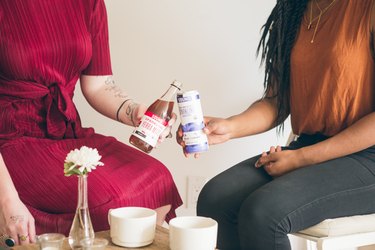
Second to water, tea is the most commonly sipped drink on the planet, according to a January 2018 study in the European Journal of Epidemiology.
And all those brewed leaves pack big health benefits: People who drink tea at least three times each week were observed to be at a lower risk for heart disease and premature death, January 2020 European Journal of Preventive Cardiology research found.
Video of the Day
Video of the Day
"Teas have been studied extensively and research shows teas are a good source of polyphenols," explains Mary Stewart, RD, LD, a registered dietitian and the owner of Cultivate Nutrition in Dallas.
"Polyphenols are abundant micronutrients in our diet, and they can potentially help to prevent degenerative diseases such as cancer and cardiovascular diseases. The teas most abundant in polyphenols include green, black, white and oolong."
The three most common polyphenols present in teas include flavanols, theaflavins and catechins, Stewart says, and these offer antioxidant qualities that protect against damaging free radicals.
But since we drink it so often, we're bound to get a bit bored by typical hot or iced tea — which is why we love switching it up with sparkling teas.
"Sparkling tea is basically brewed tea with carbonated water added," says Marisa Moore, RDN, LD, a culinary and integrative dietitian in Atlanta, Georgia. "So, it's a bubbly way to enjoy tea and can be a healthy option."
Before you buy any effervescent tea, however, it's important to note that they are not all created equal, Moore cautions us.
4 Things to Keep in Mind When Choosing Carbonated Teas
- Keep your eyes peeled for added sugars. Tea naturally contains phytochemicals and antioxidants — both of which are associated with reducing inflammation and disease risk, says Rachel Fine, RD and owner of To The Pointe Nutrition in NYC. But those benefits can be cancelled out if your sparkling tea is stoked with added sugars or artificial sweeteners.
Anything less than 20 grams means your carbonated tea will have about half the sugar of a can of soda and about as much sugar as a fruit juice, but your best bet is 0 to 4 grams of added sugar. - Count all sources of caffeine. Some caffeine is OK, and black and green teas naturally contain caffeine, Moore says. "But if you're sensitive to it, you'll want to avoid extra ingredients like guarana, which adds even more caffeine." This is especially important if you're using sparkling teas as a major hydration source and using it to replace some of your typical water consumption, Fine adds.
- Seek out short ingredient lists. The quickest and easiest way to spot a healthy sparkling tea is to flip the can around and scope out the ingredient list. "You'll quickly be able to determine if there are added ingredients you want to stay away from or limit, like excess sugars or unnecessary additives," Stewart says.
- Score bonus points for botanicals, herbs, spices and fruits. Look for organic tea to limit your potential exposure to chemicals used in conventional tea farming. Beyond that, the healthiest carbonated tea ingredient lists should just include sparkling water and possibly added botanicals, fruit, spices and herbs for natural flavor boosts, Stewart suggests.
5 Healthy Sparkling Tea Brands to Try
1. Minna
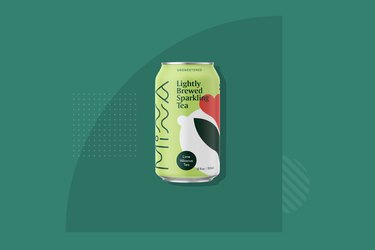
Per serving: 0 calories, 0 grams fat (0 grams saturated fat), 0 milligrams sodium, 0 grams carbohydrates (0 grams sugar), 0 grams protein
Fair-trade and fully organic, Minna offers four flavors of sparkling teas that are based on three different varieties of tea: green, black and hibiscus.
From caffeine-free Lime Hibiscus to Tropical Hibiscus Tea with 45 milligrams of caffeine, none of Minna's 12-ounce cans will leave you feeling too jittery.
"Each one of these teas offers a different health profile and are infused with extracts," Stewart says. They're great to help you stay hydrated when you're tired of plain ol' H2O since they have zero macronutrients or added sugars — just like water.
Buy it: Amazon.com; Price: $27 per 12-pack
2. Clean Cause
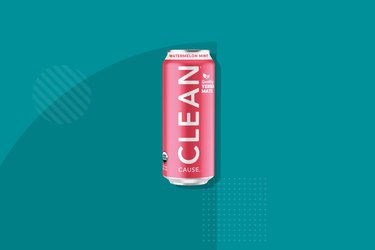
Per serving: 0–30 calories, 0 grams fat (0 grams saturated fat), 5–10 milligrams sodium, 0–8 grams carbohydrates (0–8 grams sugar), 0 grams protein
This certified organic brand has two lines of carbonated teas: one with just 8 grams of sugar and 30 calories per 8-ounce serving and another with zero calories and sugar (it's sweetened with stevia and erythritol, a keto-friendly sweetener).
Each can packs 160 milligrams of caffeine, which comes naturally via the yerba mate tea — so stick to one per day to steer clear of the jitters.
Bonus: An impressive 50 percent of the brand's profits go towards helping people coming out of rehab, homelessness or incarceration, establish a recovery routine and find employment. So you know you're sipping for a cause!
Buy it: Amazon.com; Price: $32.95 per 12-pack
3. Sound
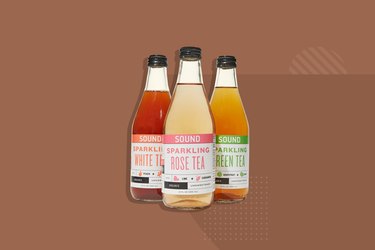
Per serving: 0 calories, 0 grams fat (0 grams saturated fat), 0 milligrams sodium, 0 grams carbohydrates (0 grams sugar), 0 grams protein
Made with organic tea leaves and no added sugar, Sound is one of the best sparkling tea lines currently available.
It's also one of the most diverse, with eight different flavors ranging from Chamomile with Vanilla and Elderflower (caffeine-free) to Yerba Mate with Citrus and Hibiscus (70 milligrams — the most caffeinated, but still about 30 milligrams less than a typical cup of coffee).
"Sound's certified organic seal eliminates the common chemicals used in conventional farming like pesticides, herbicides and fungicides," Stewart raves.
Buy it: DrinkSound.com; Price: $36 per 12-pack
4. SkinTe
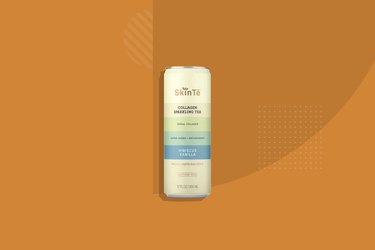
Per serving: 20–40 calories, 0 grams fat (0 grams saturated fat), 25 milligrams sodium, 6–9 grams carbohydrates (0–5 grams sugar, 0–9 grams erythritol), 3 grams protein
Depending on the flavor you go for, SkinTe serves 20 or 40 calories coming mostly from grass-fed collagen peptides per can. The Hibiscus Vanilla and Green Tea Grapefruit are sweetened with erythritol for a less blood sugar-spiking alternative to white sugar while the White Tea Ginger contains 5 grams of sugar.
Speaking of sugar, the Centers for Disease Control and Prevention suggests limiting this to 10 percent of total daily calories (that comes out to 200 calories on a 2,000-calorie daily diet). Drinking SkinTe is a nice way to step down your soda consumption.
It also earns top marks for being made with herbs for flavor and collagen peptides for a skin-brightening boost.
Buy it: SkinTe.com; Price: $29.96 per 6-pack
5. Sparkling Botanicals
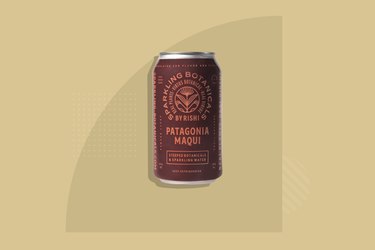
Per serving: 5–10 calories, 0 grams fat (0 grams saturated fat), 0 milligrams sodium, 1–2 grams carbohydrates (0–1 grams sugar), 0 grams protein
With a little hint of sugar and sweetness coming from fruit or fruit juice, these zero-added-sugar teas pack more health benefits than from the tea leaves alone.
The herbs and spices in each flavor — such as Patagonia Maqui and Dandelion Ginger — are designed to tame inflammation, bolster the immune system, improve digestion and more. Each serving has 0 to 60 milligrams of caffeine.
"The Turmeric Saffron flavor includes turmeric and black pepper, which research tells us may help in managing inflammatory conditions, metabolic syndrome, arthritis, anxiety and hyperlipidemia," Stewart says, citing an October 2017 study in Foods.
Buy it: Sparkling-Botanicals.com; Price: $48 per 12-pack
- European Journal of Epidemiology: “Coffee or Tea? A Prospective Cohort Study on the Associations of Coffee and Tea Intake with Overall and Cause-Specific Mortality in Men Versus Women”
- European Journal of Preventive Cardiology: “Tea Consumption and the Risk of Atherosclerotic Cardiovascular Disease and All-Cause Mortality: The China-PAR Project”
- American Journal of Clinical Nutrition: “Polyphenols: Food Sources and Bioavailability”
- CDC: “Know Your Limit for Added Sugars”
- Foods: "Curcumin: A Review of Its’ Effects on Human Health"